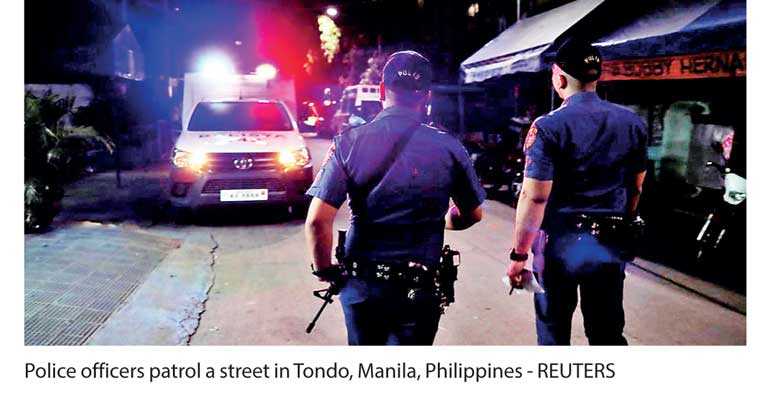Monday Feb 23, 2026
Monday Feb 23, 2026
Wednesday, 25 July 2018 00:00 - - {{hitsCtrl.values.hits}}
 REUTERS: Each night, police in teams of about a dozen fan out across the most rundown areas of the Philippine capital, rounding up slum-dwellers who linger in the streets, or teenagers who play in makeshift computer gaming shops.
REUTERS: Each night, police in teams of about a dozen fan out across the most rundown areas of the Philippine capital, rounding up slum-dwellers who linger in the streets, or teenagers who play in makeshift computer gaming shops.
Children scavenging on mountains of trash are ordered home, their parents warned of jail if minors are seen out late again. Men found shirtless, and those smoking or drinking alcohol outdoors are taken to district offices, cautioned, and their names and addresses recorded.
This is a war on loitering – instigated by Philippine President Rodrigo Duterte, famous for his bloody war on drugs and his obsession with social order.
Duterte launched it out of the blue on June 13 during one of his trademark rambling speeches, when he said people hanging out in the streets should be ordered home, and if they refused, he would personally tie their hands and drop them into a river.
Manila police took that as a directive, implementing it with gusto and some 59,000 people have since been apprehended.
The crackdown has been condemned by activists, legal groups and opposition lawmakers, who say it has no legal basis as vagrancy was decriminalised in 2012 and that Duterte is again harassing Manila’s poor, already traumatised by the war on drugs.
“This is all about imposing control on the poor, by using force or the threat of force to intimidate them. What for? The intention is to keep them from resisting, from fighting back,” said Antonio Tinio, an opposition Congressman.
But Duterte, who says the anti-loitering crackdown is a “crime prevention campaign”, has not suffered any backlash.
His public support ratings, built on the back of his reputation as disciplinarian who gets things done, remain high. A Pulse Asia poll conducted last month showed 88 percent of Filipinos approved of Duterte’s performance as president.
Formerly a mayor for two decades, Duterte built his career on his ‘tough-on-crime’ image. When he ran for president, he promised to kill thousands of narcotics dealers.
In his two years in office, police have done just that, killing at least 4,500 people they say were drug suspects who resisted arrest. In his annual State of the Nation Address on Monday, Duterte vowed the war on drugs would continue to be “relentless and chilling”.
In its first week, the anti-loitering drive also resulted in death. Genesis Argoncillo, a 25-year old arrested for not wearing a shirt, died after being beaten by his cellmates.
Since then, fewer people are being held overnight or longer in Manila’s notoriously overcrowded police station cells. Most are booked and freed, about a third are fined and some are charged with offences.
Two resolutions by a congressman and by a senator calling for a legislative probe into the crackdown were filed on June 26, although it is unclear whether one will be launched. Duterte commands a big majority in both the Congress and the Senate.